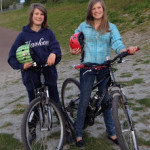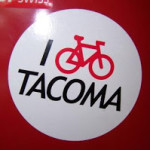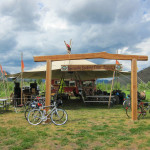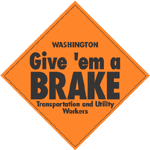Today’s guest blog post was written by former Bicycle Alliance staffer Mark Canizaro of Seattle. This was originally published in July 2005 on his personal blog.
Today I got a request from a father in Bellingham who had a wonderful idea as a parent. His son graduated from high school last month and is heading off to college next month. As a way of symbolizing the rite of passage, and a (possibly last) chance to spend some time together, they decided to bicycle together to Washington State University in Pullman. I thought it was a great idea. (He seemed to need my encouragement.)
Neither are serious bicyclists, but they’ve been enjoying riding together the last year or so and decided to take on this very big undertaking (It’s 400 miles or more). His reason for calling was a routing question. He said,
The route he was suggesting, 5 to 8 days of really miserable riding on Interstate freeways, was awful. This is not that unusual. Many people forget to stop thinking like a car when they get on a bike. Still, I was shocked… and nervous. I had a good suggestion for that last day of riding, (there is also a major highway similar to his suggestions) but I also had a half-dozen much better routes to suggest for the first week.
I took a deep breath and started in… Stevens Pass, North Cascades Highway, White Pass, Chuckanut Drive, The Skagit Valley, The Centennial Trail, back roads, country roads, bike trails, away from the highways. Quiet roads.
I finished my monologue and prepared for the response. People get very defensive about routes and it’s a strangely common reaction to be pretty angry at the suggestion of quieter routes.
I was met with silence. A long silence. A concerning silence. I wasn’t even sure he was still there.
Finally he said,
And why don’t more people bike?
I’ve had the same experience in Seattle with new or prospective cyclists asking me about routes around town, assuming that the ONLY option was the nasty, clogged, smelly, loud, intense, motor filled arterial. Forgetting that the quiet streets, the neighborhoods, the pleasant and interesting streets even exist. Missing the point.
Cyclists need to stop thinking like cars. Actually I think everyone: city planners, drivers, developers, pedestrians, EVERYONE needs to stop thinking like cars, but it’s amazing how often I see cyclists stuck in that car-think.





One Comment
This is great. Alan Durning gave a presentation at last week's Oregon Active Transportation Summit with a very similar theme: “car-head”. -Brock